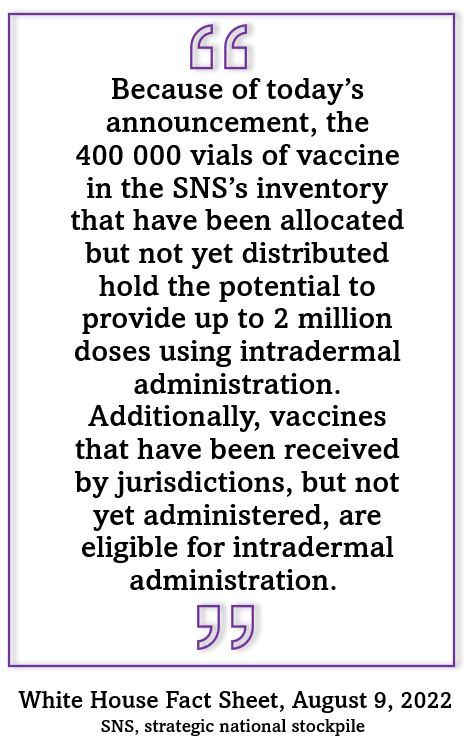- Clinical Technology
- Adult Immunization
- Hepatology
- Pediatric Immunization
- Screening
- Psychiatry
- Allergy
- Women's Health
- Cardiology
- Pediatrics
- Dermatology
- Endocrinology
- Pain Management
- Gastroenterology
- Infectious Disease
- Obesity Medicine
- Rheumatology
- Nephrology
- Neurology
- Pulmonology
FDA EUA for Monkeypox Virus Vaccine Expands Available Doses by 5-Fold
A smaller dose given by intradermal injection will expand the total US supply by a factor of 5, FDA says.

The US Food and Drug Administration (FDA) today issued an emergency use authorization (EUA) for the modified vaccinia Ankara vaccine (MVA; Jynneos, Bavarian Nordic), that will allow health care professionals (HCPs) to administer the vaccine by using an alternative dosing method for people who are aged ≥18 years and determined to be at high risk for monkeypox infection.
The EUA is granted for the intradermal route of injection which requires a smaller dose (0.1 mL) than is used in standard subcutaneous administration (0.5 mL). The adjustment will increase the total number of Jynneos doses available for use by 5-fold, according to the FDA announcement.
As of August 9, according to the Centers for Disease Control and Prevention (CDC), there were nearly 10 000 cases of monkeypox reported in the US. The US Departmment of Health and Human Services declared the virus outbreak a public health emergency on August 4, 2022.
The EUA also allows HCPs to administer the vaccine to persons younger than age 18 years considered to be at high risk for monkeypox infection; for this population Jynneos is administered subcutaneously.
“In recent weeks, the monkeypox virus has continued to spread at a rate that has made it clear our current vaccine supply will not meet the current demand,” said FDA Commissioner Robert M. Califf, MD. “The FDA quickly explored other scientifically appropriate options to facilitate access to the vaccine for all impacted individuals. By increasing the number of available doses, more individuals who want to be vaccinated against monkeypox will now have the opportunity to do so.”
The FDA cites data from a 2015 clinical study of the MVA vaccine that demonstrated that one-fifth of the standard dose when given intradermally on the same 2-dose schedule as the standard-volume subcutaneous shots produced a comparable immune response. Intradermal vs subcutaneous administration, the FDA says, produced more “redness, firmness, itchiness, and swelling at the injection site,” but the discomfort of the intradermal shot was less, and the side effects were manageable.
The standard dosing schedule—2 doses given 4 weeks apart—is still required, according to the agency statement. A White House fact sheet on the actions leading to today’s EUA states: “Individuals who received their first dose subcutaneously can receive their second dose intradermally or subcutaneously.”
“Individuals who received their first dose subcutaneously can receive their second dose intradermally or subcutaneously.”
The fact sheet also indicates that although intradermal drug administration is a standard skill among HCPs and that the supplies needed to administer Jynneos this way also are part of standard clinical inventory the Biden Administration will “actively engage providers and clinicians to ensure they are prepared to use this approach for most adults who need Jynneos vaccine.”
Jynneos was assessed in immunocompromised persons in trials performed to support its approval and found safe and effective in this vulnerable population. The vaccine was initially developed specifically as an alternative for use in immunocompromised individuals in the event of a smallpox outbreak, according to the FDA.
The agency states that it has determined that the known and potential benefits of Jynneos outweigh the known and potential risks for the authorized uses. Importantly, as of August 10 the agency was not recommending vaccination for the general public, but for people who have been exposed to monkeypox. “Currently, a high rate of the known cases in the US are among gay and bisexual men and transgender and non-binary people, but this virus is not limited by sexuality or gender,” FDA said.
For more information, the FDA directs readers to its monkepox webpage.
